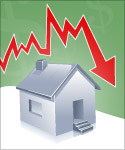There’s been a lot of fuss on how the “fiscal cliff” will get the U.S. economy into trouble in 2013. For starters, here’s a thorough explanation of how it can impact the economy.
(Video published by the WSJ on Oct. 31, 2012.)
In short, the extensive tax cuts passed by Congress almost ten years ago were set to expire at the end of 2012. Along with a large number of public spending cuts, a major effect of the fiscal cliff would be a four to five percent reduction in the country’s GDP, ultimately affecting job growth and commercial activity. But austerity measures such as this wouldn't be something new. Europe has been implementing the same policy to curb their rising deficits.
But how does the fiscal cliff affect the real estate industry?
A study by Benjamin Harris of the Tax Policy Center of the Urban Institute and the Brookings Institution simulates home prices in 23 metropolitan areas on the how various tax changes would affect the equilibrium price of housing. As summarized by Jason Van Steenwyk , the paper’s key findings include:
- Taken in isolation, the proposal to limit the value of the mortgage interest deduction to 28 percent would reduce metropolitan housing values by 6.9 to 15.0 percent.
- The proposal to raise the 33 percent income tax rate to 36 percent would raise housing prices by between 2.7 and 6.0 percent.
- And the proposal to increase the capital gains tax rate for upper-income taxpayers would raise metropolitan housing prices by between 0.9 and 2.3 percent.
The National Association of Realtors (NAR) recently posted an article on how the fiscal cliff could affect the industry. The entry states, “Foreclosures would rise, home values would drop, hurting households but also hurting the Federal Housing Administration (FHA), which could get hit with another wave of bad loans. That could put FHA into financial trouble.”
“Against this background, the federal government will be looking at a lot of options for averting the cliff while also lowering the federal budget deficit for the long-term. That puts the mortgage interest deduction into the spotlight.”
That’s why Congress is in shambles on how to control such a downward spiral and prevent future shocks to affected industries, especially real estate.
Inflation
Inflation, or the general increase in the level of prices of goods and services, explains why a dollar that you earn today can only buy fewer amounts of goods compared to previous years. Simply put, think of how many bars of chocolate you can buy with $50 today compared to what you could purchase a decade ago.
Real estate, according to most experts, is a good tool to hedge against inflation. In other words, as inflation takes place, real estate values, as well as rents, tend to go up. Purchase a property today and its value could double in the next 10 years or so.
Several research studies have proven the feasibility of real estate as a hedge against inflation. Brad Case and Susan Wachter of the University of Pennsylvania analyzed the historical performance of real estate as an inflation hedge from 1978 to 2011. They concluded that real estate performed well compared to other inflation-sensitive assets and has allowed investors to be less exposed to inflation risks during the same time period.
Even real estate mogul Donald Trump declares how real estate is a good hedge against inflation. In an interview, he opines, “I like it because I think you are going to have massive inflation at some point, and to me real estate is a much better hedge against inflation than gold… I think it's a great time to buy a house whether you live in it or rent it out.”
So with the fiscal cliff still haunting the real estate industry and economy, there’s no better way to fight it but to invest in prudent income-producing rental properties.



